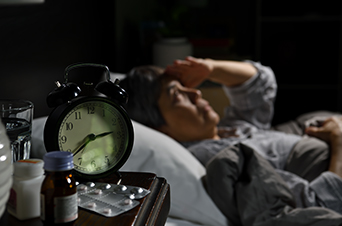
Insomnia is when one may struggle to fall asleep or stay asleep. Even after sleeping throughout the night, one may feel distorted, low on energy, or sleepy during the day. Insomnia is a common problem that affects millions, and, in some cases, it can be both—a symptom as well as a repercussion (Cornerstone, Mai & Buysse, 2008). Paradoxical Insomnia is a sleep disorder that leaves a person frustrated and emotionally distressed.
Paradoxical insomnia is a baffling state where the individual feels awakened despite sleeping through the night. But what could be the paradoxical insomnia symptoms, repercussions, causes, and treatments? To know all this and more—cling to the blog till the end!
What is Paradoxical Insomnia—a Deeper Dive to Know Better
While paradoxical insomnia is an emotionally distressing state, it may also cause conflicts between loved ones. Moreover, it may lead the affected individual to excessive use of sleep medication. But what exactly happens in paradoxical insomnia? It is a sleep disorder where an individual feels sleep-deprived despite a complete night’s rest. People with this sleep disorder often assume that they have slept a lot less whereas in actuality they almost sleep to normal sleep lengths.
Paradoxical insomnia is also referred as sleep state misperception. The condition can either make people underestimate or overestimate the sleep duration while the factual timespan could vary. This perplexing sleeping disorder can affect around 50% of people having insomnia (Health match, Aug 2022).
What Causes Paradoxical Insomnia?
What exactly causes Paradoxical Insomnia is still vague and not yet defined but it is believed that certain brain activities may play a distinctive role. However, there are certain common signs that may be considered as interconnected causes of paradoxical insomnia. Let’s dig in deeper and explore influential causes:
Psychological Factors:
Emotional well-being plays a pivotal role in regulating quality sleep and maintaining overall health. Emotional stress, anxiety, or depression may lead to excessive alertness disrupting the sleep-wave cycle and hindering quality sleep. This state may ultimately lead to paradoxical insomnia. Furthermore, increased anxiety levels and abrupt mood changes may pave its way to restlessness and rumination. These psychological factors can be considered acute in developing sleep state misperception and feeling sleep deprived.
State of Hyperarousal:
As per research, the state of hyperarousal adds to a person’s perception of not having enough sleep. People with anxiety and depression tend to encounter hyperarousal. This state of hyperarousal prevails due to consistent dwelling of negative thoughts and stress. Hyperarousal along with some other disorders such as bipolar disorder or schizophrenia may carve the way to paradoxical insomnia.
Physical Factors or Biological Conditions:
Dysfunction of neurotransmitters or disruption of circadian rhythms can also be the culprit behind paradoxical insomnia. There could be other biological conditions marking the way up to paradoxical insomnia. Conditions such as restless leg syndrome, sleep apnea, nocturnal seizures, excruciating pains, or medical discomfort could also contribute to the prevailing condition of insomnia.
Behavioral Factors or Lifestyle Changes:
Certain behavioral patterns and lifestyle factors may contribute to paradoxical insomnia. Irregular bed timings, excessive caffeine intake before bed, unbridled screen time, sparse sleep hygiene, and uncontrolled alcohol consumption are few factors on the tips that play a part in developing paradoxical insomnia.
Paradoxical Insomnia Symptoms
Knowing the range of symptoms that indicates sleep state misperception could help curb the effects and understand the causes that could be worked upon. But what exactly are the paradoxical insomnia symptoms? Sleep state misperception impacts an individual’s overall health, exerting significant debilitating impairment. Let’s explore the deal further!
There could be both nighttime and daytime paradoxical insomnia symptoms
- Nighttime Hazards: Difficulty in falling asleep, nighttime disturbances, and awakenings at every short interval are a few symptoms that could be a sign of sleep state misperception. Despite the issues, it is observed that the individual may sleep restfully presuming sleep deprivation.
- Heightened Brain Stimulation: People with sleep state misperception tend to respond actively to the stimuli in their surroundings due to heightened brain stimulation or active brain. They may respond strongly to lights and sounds in the environment. Moreover, racing thoughts and persistent overthinking may add to paradoxical insomnia symptoms.
- Daytime Hazards: Fatigue, mild sleepiness, difficulty in concentrating, mood swings, trouble being productive at work, and overall health deterioration—these are some common daytime paradoxical insomnia symptoms that an individual might experience.
The Adverse Impacts of Sleep State Misperception
Ranging from mental well-being to social and occupational functioning—everything gets affected due to sleep state misperception. It does not only thrive within the realm of sleep but also exerts considerable impacts on daily life and activities. The discrepancy between the actual sleeping hours in contrast to the perception of an individual pervades debilitating influence on daily life.
Paradoxical Insomnia or sleep state misperception may weaken the immune system due to perceived sleep deprivation. It is imperative to understand the massive impact our mind exerts on our physical well-being. Consistently perceiving sleep deprivation despite having adequate sleep latency can adversely impact overall health. Moreover, the risk of cardiovascular disease and metabolic imbalance could also be experienced by people with paradoxical insomnia.
Furthermore, fluctuations in weight and appetite are also observed in people with sleep state misperception. Timely diagnosis and adequate medical intervention could help mitigate the adverse effects on overall physical health.
The exhausting battle between reality and perception may take a toll on mental health as well. Depression, anxiety, and stress may trigger the prevailing condition or may add to the new ones too. Hence, seeking medical help may put a full stop to the negative impacts of this condition.
Performing optimally at the workspace or being socially available seems more of a task than ever before. Cognitive deficits, difficulty in concentrating, and deviated attention can keep you from performing optimally and securing distinctive position. In addition to this, being socially inactive can manifest laziness or disinterest in the eyes of many, putting an individual in the wrong light. In short, sleep state misperception comprehensively exerts negative impacts that are beyond restful sleep.
How to Treat Paradoxical Insomnia?
Surviving with a false perception of inadequate sleep can be quite challenging for people with paradoxical insomnia. While there are no standard treatment protocols that could be followed for this sleep condition. However, there are specific therapies that could help develop coping mechanism.
Since there is no standard medication that could come to the rescue, cognitive behavioral therapy may come in handy in treating paradoxical insomnia. This behavioral therapy is helpful in training the mind and body for restful sleep. This therapy inculcates positive thoughts and sleeping habits while eliminating negative thoughts and behaviors associated with sleep.
Another way to combat the prevailing sleep condition is to maintain sleep hygiene to the fullest. This may include minimizing noise, having dim lights, and a comfortable room temperature that could ease the mind permeating it to sleep.
In addition to these certain medications can be given in severe cases. These medications include sedatives and hypnotics that could only be prescribed by a practicing expert. Moreover, these medications can be used under the supervision of a healthcare provider to ensure safety and effectiveness. These are given for a short period as they may impose consequential side effects.
Lastly, implementing lifestyle changes may massively exert a positive impact on sleep quality. Adhering to a sleep schedule and instilling a bedtime routine may signal the brain to fall asleep, resulting in quality sleep.
Final Thoughts
To sum up, paradoxical insomnia is a multifaceted sleep disorder that requires exclusively tailored strategies. Through identification of causes, observation of symptoms, and early diagnosis—a lot can be controlled, seeking help from a professional.
Working with a healthcare provider to resolve paradoxical insomnia could involve CBT-I as the first-line treatment. This approach gradually changes the way an individual perceives sleep. The ability to discriminate between reality and perception improves over time through behavioral therapy.
Also, self-awareness is imperative in such cases. It reduces anxiety and improves perception on emotional and cognitive levels. Seeking medical help and speaking your heart out could make a visible difference in such cases!

